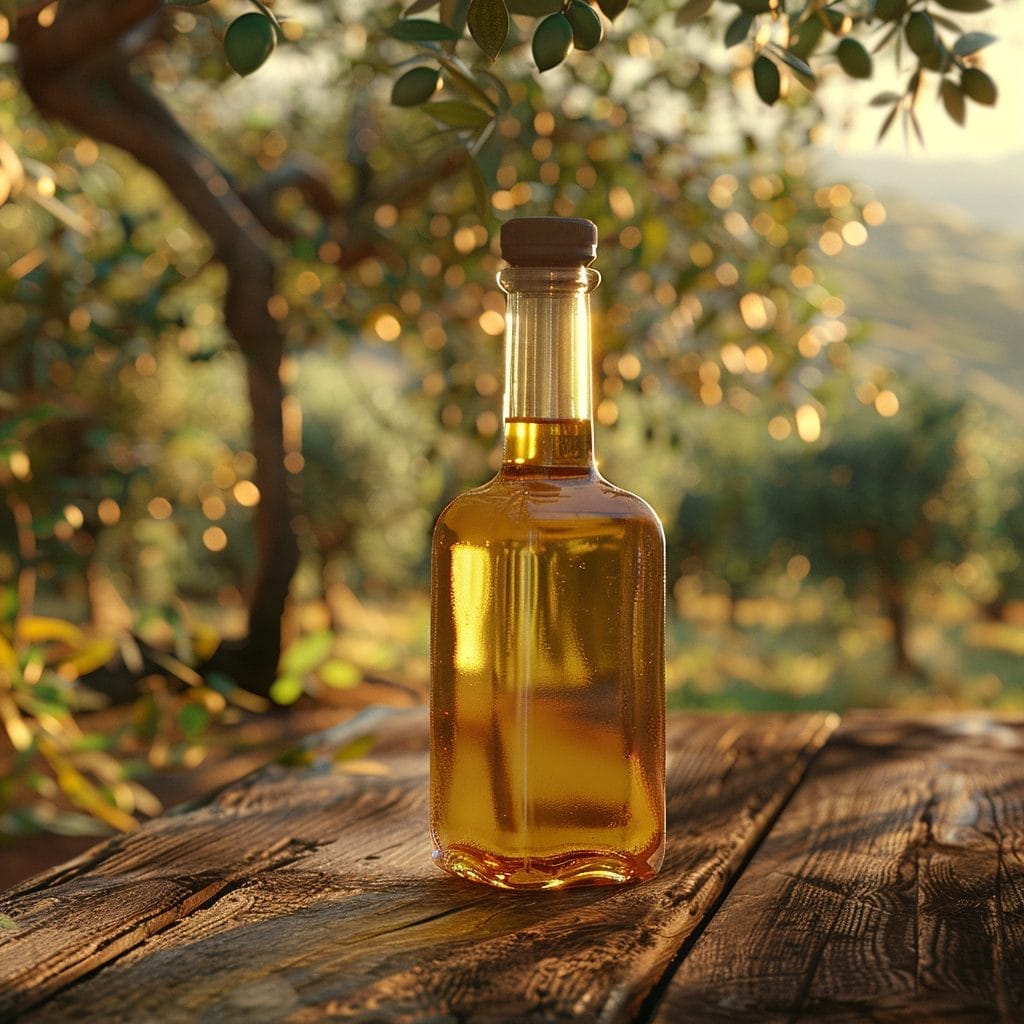Picture this: I’m in a small Tuscan village, sharing a meal with a local family. The grandmother, Nonna Maria, pulls out a bottle of Italian olive oils. It’s golden and fragrant — a product of her family’s own olive groves. With a simple flourish, she drizzles it over a bowl of ripe tomatoes, fresh mozzarella, and basil. Suddenly, this humble salad is transformed into a masterpiece.
This experience opened my eyes to the magic of authentic Italian cuisine, where Italian olive oils aren’t just ingredients; they are cornerstones of flavor and tradition.

The world of Italian olive oils can be overwhelming, but I’m here to guide you through it. Understanding olive oil selection and its culinary uses can elevate your cooking from ordinary to gourmet.
From choosing the right grade to reading labels, this guide will arm you with the knowledge to make informed choices. These insights will turn Italian olive oils into staples in your kitchen, enhancing every dish you create.
The Rich History of Italian Olive Oils
Italian olive oils boast a history as rich and flavorful as the oils themselves. This journey starts with the ancient olive cultivation methods and reveals how Italian olive oil became integral to the Mediterranean diet.
Olive trees, intertwined with the very roots of Italy, have witnessed empires rise and fall, holding stories of family-owned groves passed down through centuries.
The Origins of Olive Oil in Italy
The origins of traditional Italian olive oil date back to ancient Italian olive cultivation. The early Romans and Etruscans perfected the growth and harvesting techniques that we respect today.
This essential aspect of the Mediterranean diet gained prominence, influencing both culinary heritage and daily life in ancient Italy. Today, the methods may have modernized, but the deep connection to the land remains unchanged.
Significance in Italian Culture
The significance of olive oil in Italian culture goes beyond just food. It’s a symbol of hospitality and familial bonds that stands at the heart of many Italian traditions.
Traditional Italian olive oil isn’t just a kitchen staple; it’s an embodiment of Italy’s culinary heritage. The golden liquid has earned a hallowed place at every Italian table, becoming an undeniable influence on the Italian way of life.
How to Choose the Best Italian Olive Oils
Selecting the best Italian olive oils can be like finding a hidden treasure. It all starts with understanding the different grades of olive oil.
Understanding Olive Oil Grades
The term “extra virgin olive oil” often indicates top quality. This grade means the oil is made from the first pressing of olives without any heat or chemicals involved, also known as cold pressing. The flavor is robust, fresh, and packed with nutrients.
Other grades, like “virgin olive oil,” still come from the first press but may hold slightly higher acidity levels. The difference often lies in the taste and the extraction process. Always aim for cold-pressed oils to ensure maximum flavor and health benefits.
Reading Olive Oil Labels
Olive oil labels can seem daunting, but understanding a few key terms will make things easier. Always look for DOP certification. This label assures the oil’s authenticity and ties it to a specific geographical region in Italy, guaranteeing its quality.
The label should also list the Italian olive oil varieties used in production. Each variety brings a unique flavor profile to the table.
Take note of the harvest date for freshness, and check for clear storage instructions. Armed with this knowledge, you’ll confidently select the perfect bottle every time.
Health Benefits of Italian Olive Oils
The allure of Italian olive oils isn’t just in their taste but also in their numerous health benefits. Loaded with monounsaturated fats and rich in antioxidants like polyphenols, these oils are a heart-healthy addition to any diet.
Let’s delve into the remarkable health benefits these Italian treasures offer.
Rich in Antioxidants
Italian olive oils are packed with polyphenols, which have robust antioxidant properties. These compounds help combat oxidative stress, protecting your body from chronic diseases such as heart disease and cancer.
Embracing a Mediterranean lifestyle, where olive oil plays a central role, can lead to improved overall health.
Healthy Fats
These oils are high in monounsaturated fats, known for their heart-protective qualities. Monounsaturated fats can help reduce bad cholesterol levels, decreasing the risk of heart disease and stroke.
Additionally, the anti-inflammatory properties of the oils contribute to reducing inflammation in the body and promoting better health.
Incorporating Italian olive oils into your daily routine isn’t just about gourmet taste—it’s about embracing a healthier, more vibrant lifestyle. So, next time you reach for a cooking oil, remember the incredible benefits of choosing Italian olive oils.
Creative Ways to Use Italian Olive Oils in Your Cooking
Italian olive oils are a culinary treasure that can transform everyday meals into extraordinary gourmet dishes. By incorporating them into your cooking, you’ll unlock flavors that elevate both simple and sophisticated recipes.
Simple Salad Dressings
Creating homemade dressings is one of the simplest and most rewarding ways to use Italian olive oils. A basic vinaigrette can be made by whisking together extra virgin olive oil, vinegar, mustard, and seasonings.
Experiment with different combinations to match your salad ingredients. Infused olive oils add unique twists with flavors like basil, garlic, or chili, making your dressings stand out.

Cooking and Baking
Olive oil is not just for drizzling. It’s fantastic for cooking and baking, too. Try replacing butter in your baking recipes with Italian olive oil for a healthier alternative that adds a rich, moist texture.
Whether sautéing vegetables or roasting meats, the flavor profile of high-quality olive oil enhances the taste and nutrition of your dishes.
Finishing Touch
A drizzle of premium olive oil as a finishing touch can elevate simple dishes into gourmet cuisine. Think freshly cooked pasta, grilled fish, or even a bowl of soup.
Right before serving, a splash of infused olive oils can impart depth and complexity, offering a delightful sensory experience. This method is a favorite among chefs to enhance the flavors subtly yet effectively.
With these olive oil recipes, you can turn every meal into a culinary delight. From homemade dressings to gourmet dishes, Italian olive oils are versatile and indispensable in the kitchen.
Conclusion
In this culinary journey, we’ve traversed through the historic landscapes of Italy, picked the finest olive oils, and learned how to craft dishes that sing with flavor.
Embracing Italian olive oils is about more than just adding a new ingredient to your pantry; it’s about infusing your cooking with history, health, and heart.
My goal in creating this Italian olive oil guide was to offer you a beacon for your culinary exploration, empowering you to create and savor your dishes with the authentic touch of Italy.
Remember, choosing the right olive oil is key. We’ve explored how to understand olive oil grades and read labels effectively. By selecting the best Italian olive oils, you’re not just enhancing food flavors—you’re transforming your entire dining experience.
The rich health benefits, from antioxidants to healthy fats, further underscore the value of integrating these oils into your meals.
As you experiment with simple salad dressings, cooking, baking, or adding that perfect finishing touch, keep in mind how every drop of Italian olive oil brings a taste of Italy to your table.
Use this guide as a foundation, but don’t be afraid to explore and make it your own. Here’s to many delicious meals and unforgettable culinary adventures!
FAQ
What makes Italian olive oil a staple in authentic Italian cuisine?
Italian olive oil is revered for its rich flavors and quality. It’s a versatile ingredient that can elevate any dish, from salads to pastas. The oil’s delicate balance of fruity, peppery, and sometimes buttery notes is what makes it a cherished staple in authentic Italian cooking.
How do I choose the best Italian olive oil for my recipes?
Start with understanding olive oil grades, such as extra virgin and cold-pressed. Look for DOP certification on labels, which guarantees the authenticity and origin of the oil. Pay attention to the color, aroma, and flavor profiles to find one that matches your cooking needs.
What are the health benefits of using Italian olive oils?
Italian olive oils are rich in monounsaturated fats and antioxidants like polyphenols. These contribute to heart health, anti-inflammatory properties, and overall longevity. Incorporating these oils into your diet can align with a healthy Mediterranean lifestyle.
How can I use Italian olive oil creatively in my cooking?
Italian olive oils can be used in simple salad dressings, cooking and baking, and as a finishing touch on gourmet dishes. Experimenting with infused olive oils can also add unique flavors to your creations, enhancing both taste and culinary innovation.
Why is DOP certification important when selecting Italian olive oil?
DOP certification ensures that the olive oil is produced, processed, and packaged in a specific region of Italy, following traditional methods. This guarantees the quality, authenticity, and traceability of the olive oil, making sure you get a superior product.
Are there different varieties of Italian olive oils to consider?
Yes, Italy boasts numerous olive oil varieties, each with distinct characteristics. Popular ones include Tuscan, Sicilian, and Ligurian olive oils. Each variety can have different flavor profiles and uses, enhancing different types of dishes.
Can Italian olive oil be used for baking?
Absolutely! Italian olive oil can be a fantastic substitute for butter or other oils in baking. It adds a unique flavor and moist texture to cakes, breads, and cookies. Try it in recipes where you want to highlight rich and fruity undertones.
What is the significance of olive oil in Italian culture?
Olive oil in Italian culture goes beyond cooking. It’s a symbol of hospitality, tradition, and familial bonds. Olive trees and the oils they produce have witnessed centuries of history, with groves often passed down through generations, embodying the essence of Italian heritage.
How should I store my Italian olive oil?
Store your Italian olive oil in a cool, dark place, away from heat and light, which can degrade its quality. Use a dark glass bottle or a stainless steel container to prolong its freshness. Proper storage ensures you enjoy the oil’s full flavor and health benefits.

